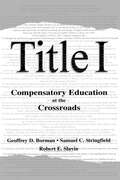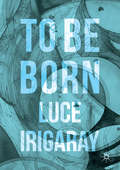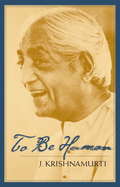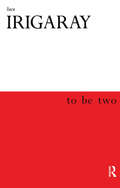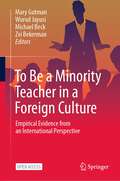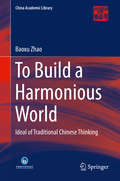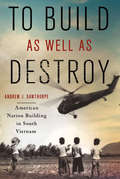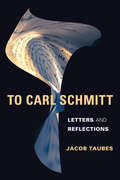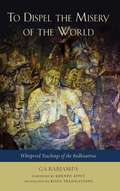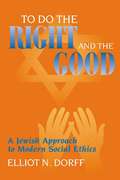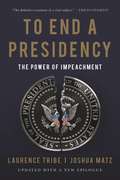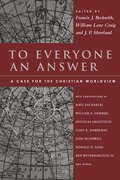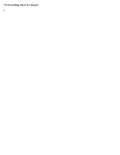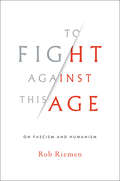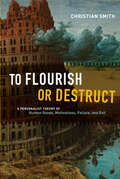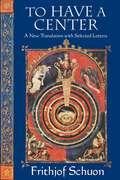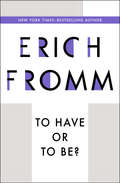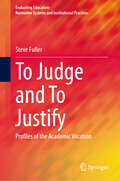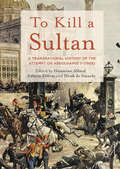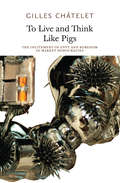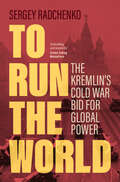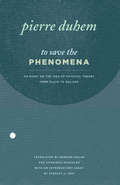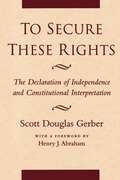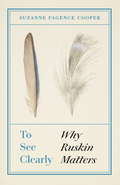- Table View
- List View
Title I: Compensatory Education at the Crossroads (Sociocultural, Political, and Historical Studies in Education)
by Robert E. Slavin Samuel C. Stringfield Geoffrey D. BormanThe authors present evidence and theory that explain the positive trend for Title I effects and the recent leveling of this trend in program outcomes. They document the finding that Title I has had a modest positive impact on student achievement.
Title and Deed / Oh, the Humanity and other good intentions
by Will Eno"A haunting and often fiercely funny meditation on life as a state of permanent exile... The marvel of Mr. Eno's voice is how naturally it combines a carefully sculptured lyricism with sly, poker-faced humor. Everyday phrases and familiar platitudes-'Don't ever change,' 'Who knows'-are turned inside out or twisted into blunt, unexpected punch lines punctuating long rhapsodic passages that leave you happily word-drunk." -Charles Isherwood, New York Times on Title and Deed"Title and Deed is daring within its masquerade of the mundane, spectacular within its minimalism and hilarious within its display of po-faced bewilderment. It is a clown play that capers at the edge of the abyss... Eno's voice is unique; his play is stage poetry of a high order. You can't see the ideas coming in Title and Deed. When they arrive-tiptoeing in with a quiet yet startling energy-you don't quite know how they got there. In this tale's brilliant telling, it is not the narrator who proves unreliable but life itself. The unspoken message of Eno's smart, bleak musings seems to be: enjoy the nothingness while you can." -John Lahr, New Yorker"Eno is a supreme monologist, using a distinctive, edgy blend of non sequiturs and provisional statements to explore the fragility of our existence... There are a lot of words, but they are always exquisitely chosen... Oh, the Humanity reveals that we are beautiful walking tragedies blinking with absurd optimism into the camera lens of history." -Lyn Gardner, GuardianKnown for his wry humor and deeply moving plays, Will Eno's "gift for articulating life's absurd beauty and its no less absurd horrors may be unmatched among writers of his generation" (New York Times). This new volume of the acclaimed playwright's work includes five short plays about being alive-Behold the Coach, in a Blazer, Uninsured; Ladies and Gentlemen, the Rain; Enter the Spokeswoman, Gently; The Bully Composition; and Oh, the Humanity-as well as Title and Deed, a haunting and severely funny solo rumination on life as everlasting exile.WILL ENO is a fellow of Residency Five at Signature Theatre Company in New York. His play The Open House premiered at Signature in 2014, and received an Obie Award, the Lucille Lortel Award for Best Play, and a Drama Desk Special Award. His play The Realistic Joneses premiered at Yale Repertory Theatre in 2012, and was produced on Broadway in 2014, for which he and the cast received a Drama Desk Special Award. His play Title and Deed premiered at Signature in 2012 and was presented at the Edinburgh Fringe Festival in 2014. Both Title and Deed and The Realistic Joneses were included in the New York Times Best Plays List of 2012. Gnit, an adaption of Ibsen's Peer Gynt, premiered at Actors Theatre of Louisville in 2013. Middletown, winner of the Horton Foote Prize, premiered at the Vineyard Theatre in New York in 2010, and was then produced at Steppenwolf Theatre Company in Chicago in 2011. Thom Pain (based on nothing) was a finalist for the 2005 Pulitzer Prize and has been translated into many languages. The Flu Season premiered at the Gate Theatre in London in 2003, and later received the Oppenheimer Award for best New York debut production by an American writer. Tragedy: a tragedy premiered at the Gate Theatre in 2001, and was subsequently produced by Berkeley Repertory Theatre in 2008. Mr. Eno lives in Brooklyn with his wife Maria Dizzia and their daughter Albertine.
To Be Born: Genesis of a New Human Being
by Luce Irigaray“According to the words of Phaedrus in the Symposium of Plato, Love, sometimes named Eros, has no parents, no age, no history, and its origin remains unknown to anyone. Love, whose destiny is said to be unique amongst the gods and humans, perhaps embodies desire for a conjunction always in search of its happening. Love would represent a dynamism longing for the copula incarnating the transcendence of our being. As such, Love would remain the everlasting yearning for the accomplishment of the ecstatic destiny of humanity.” In this book, Luce Irigaray - philosopher, linguist, psychologist and psychoanalyst - proposes nothing less than a new way of conceiving what a human being is as well as a means to ensure our individual and relational development from birth. Unveiling the mystery of our origin is probably what most motivates our quests and plans. And yet such a disclosure proves to be impossible. Indeed we were born as one from a union between two, and we are forever deprived of an origin of our own. Hence our ceaseless search for roots: in our genealogy, in the place where we were born, in our culture, religion or language. But a human being cannot develop from its own roots as a tree does. As humans, we must take responsibility for our own being and existence without any given continuity with our origin and background. How can we achieve that? First by cultivating our breathing, which is more than a means to come into the world and to exist; breathing also allows us to transcend mere survival to secure for ourselves a spiritual becoming. Taking on our sexuate belonging is the second element which enables us to assume our natural existence. Indeed, this determination at once brings us energy and provides us with a structure which contributes to our individuation and our relations with other living beings and the world. Our sexuation can compensate for our absence of roots too by compelling us to unite with the other sex so that we freely approach the copulative conjunction from which we were born; that is, the mystery of our origin. This does not occur through a mere sexual instinct or drive, but requires us to cultivate desire and love with respect for our mutual difference(s). In this way we can give rise to a new human being, not only at a natural but also at an ontological level.
To Be Human
by Jiddu KrishnamurtiTo Be Human presents Krishnamurti's radical vision of life in a new way. At the heart of this extraordinary collection are passages from the great teacher's talks that amplify and clarify the nature of truth and those obstacles that often prevent us from seeing it. Most of these core teachings have not been available in print until now. Besides presenting the core of Krishnamurti's message, the book alerts the reader to his innovative use of language, the ways in which he would use "old words with new interpretations," then gives practical examples, showing that we can clarify our understanding of life itself--and act on this new understanding. The splendid introduction by David Skitt discusses Krishnamurti's philosophy as a guide to knowledge and experience, the roles knowledge and experience should play in our lives, and the times when it is best to cast them aside and "look and act anew." The book's source notes will aid the inquisitive reader who wishes a deeper understanding of this great teacher's message.
To Be Two (Athlone Contemporary European Thinkers Ser.)
by Luce IrigarayFirst published in 2001. Routledge is an imprint of Taylor & Francis, an informa company.
To Be a Minority Teacher in a Foreign Culture: Empirical Evidence from an International Perspective
by Michael Beck Zvi Bekerman Mary Gutman Wurud JayusiThis open access book offers in depth knowledge on the challenges and opportunities offered by the inclusion of minority teachers in mainstream educational settings from an international perspective. It aims to be a unique and important contribution for scholars, policy-makers, and practitioners considering the complexities brought about by global trends into national/local educational systems and settings. It will also serve to guide future research, policy, and practice in this important field of inquiry. The work will contribute answers to questions such as: How do immigrant/minority teachers experience their work in mainstream educational settings?; How do mainstream shareholders experience the inclusion of immigrant/minority teachers in mainstream educational settings?; What is the effect of the successful (and/or unsuccessful) integration of minority teachers and teacher educators into mainstream education settings?.
To Build a Harmonious World
by Baoxu ZhaoThis book collects the work of Zhao Baoxu, a prominent scholar of political science, international political scientist and educator. It features more than 14 papers that fully explore the political thoughts of Professor Zhao, who was deeply rooted in his concern for China, its people and the world. Going through the vicissitudes in both the 20th and the 21st centuries, Mr. Zhao witnessed and experienced the twists and turns in the birth and development of political science in China. He also participated and promoted the restoration and advancement of contemporary political science in China. Roaming widely in the studies on social science, philosophy, politics, culture and international relations, he spared no effort to explore the political nature and development trend of human society and the path to rejuvenate China and lead the nation towards a high level of civilization. In addition, he ardently appealed for world peace and common development. Inside this book, readers will discover rich and profound political thoughts, intellectual treasures in the area of social culture and political science in China. Professor Zhao's work offers scholars a unique insight into understanding and grasping the history and development of socialism with Chinese characteristics.
To Build as Well as Destroy: American Nation Building in South Vietnam
by Andrew J. GawthorpeFor years, the so-called better-war school of thought has argued that the United States built a legitimate and viable non-Communist state in South Vietnam in the latter years of the Vietnam War and that it was only the military abandonment of this state that brought down the Republic of Vietnam. But Andrew J. Gawthorpe, through a detailed and incisive analysis, shows that, in fact, the United States failed in its efforts at nation building and had not established a durable state in South Vietnam.Drawing on newly opened archival collections and previously unexamined oral histories with dozens of U.S. military officers and government officials, To Build as Well as Destroy demonstrates that the United States never came close to achieving victory in the late 1960s and early 1970s. Gawthorpe tells a story of policy aspirations and practical failures that stretches from Washington, D.C., to the Vietnamese villages in which the United States implemented its nationbuilding strategy through the Office of Civil Operations and Revolutionary Development Support known as CORDS. Structural factors that could not have been overcome by the further application of military power thwarted U.S. efforts to build a viable set of non-Communist political, economic, and social institutions in South Vietnam.To Build as Well as Destroy provides the most comprehensive account yet of the largest and best-resourced nation-building program in U.S. history. Gawthorpe's analysis helps contemporary policy makers, diplomats, and military officers understand the reasons for this failure. At a moment in time when American strategists are grappling with military and political challenges in Afghanistan, Iraq, and Syria, revisiting the historical lessons of Vietnam is a worthy endeavor.
To Carl Schmitt: Letters and Reflections (Insurrections: Critical Studies in Religion, Politics, and Culture)
by Jacob TaubesA philosopher, rabbi, religious historian, and Gnostic, Jacob Taubes was for many years a correspondent and interlocutor of Carl Schmitt (1888–1985), a German jurist, philosopher, political theorist, law professor—and self-professed Nazi. Despite their unlikely association, Taubes and Schmitt shared an abiding interest in the fundamental problems of political theology, believing the great challenges of modern political theory were ancient in pedigree and, in many cases, anticipated the works of Judeo-Christian eschatologists. In this collection of Taubes's writings on Schmitt, the two intellectuals work through ideas of the apocalypse and other central concepts of political theology. Taubes acknowledges Schmitt's reservations about the weakness of liberal democracy yet distances himself from his prescription to rectify it, arguing the apocalyptic worldview requires less of a rigid hierarchical social ordering than a community committed to the importance of decision making. In these writings, a sharper and more nuanced portrait of Schmitt's thought emerges, as well as a more complicated understanding of Taubes, who has shaped the work of Giorgio Agamben, Peter Sloterdijk, and other major twentieth-century theorists.
To Dispel the Misery of the World
by Ga Rabjampa Khenpo Appey Rigpa Translations"Offered here is the pith advice on mind training according to the great vehicle. This is the path followed by all the buddhas and their children of the past, present, and future, the most profound instruction of the oral lineage, and the quintessence of the ocean of all the excellent teachings."--Ga Rabjampa This short book contains a wealth of advice for those wanting to become more fully human. When we are disconnected from others we flounder; only by recognizing the profound interdependence of all beings do we flourish and grow. The famous Seven-Point Mind Training, in just a few pages of one-line instructions, provides direct and powerful advice for breaking through the chronic barriers that separate us from those around us. It is easy to see why it is one of the most cherished texts in all of Tibetan Buddhism. Ga Rabjampa, an influential master of the fifteenth century, here uses the Seven-Point Mind Training as the basis for illuminating the essential teachings on Buddhism, giving special attention to the practices of giving and taking (tonglen) and of transforming adversity into opportunities for spiritual growth.
To Do the Right and the Good: A Jewish Approach to Modern Social Ethics
by Elliot N. DorffFrom the preface: One glance at the contents of this book amply explains why anyone would be interested in its topics: Communal relations, interfaith relations, national policy, procedural justice, poverty, war, and forgiveness among individuals and communities are issues that have deeply affected human life from its very inception. The modern world's instant communication over any distance; its internationally interwoven economy; its capabilities of mass destruction; and its simultaneous potential for true global learning, understanding, and enrichment make these age- old issues all the more compelling. Some of the old answers seem to do just fine in our modern world, whereas others seem to be woefully inadequate. In some cases, we are not even sure how to apply ancient wisdom to the new circumstances in which we find ourselves. New explorations of these issues, then, are clearly in order.
To End a Presidency: The Power of Impeachment
by Laurence Tribe Joshua Matz<P>The history and future of our democracy's ultimate sanction, presidential impeachment, and a guide to how it should be used now <P> To End a Presidency addresses one of today's most urgent questions: when and whether to impeach a president. <P>Laurence Tribe and Joshua Matz provide an authoritative guide to impeachment's past and a bold argument about its proper role today. In an era of expansive presidential power and intense partisanship, we must rethink impeachment for the twenty-first century. <P>Of impeachments, one Constitutional Convention delegate declared, "A good magistrate will not fear them. A bad one will be kept in fear of them." <P>To End a Presidency is an essential book for all Americans seeking to understand how this crucial but fearsome power should be exercised.
To Everyone an Answer: A Case for the Christian Worldview
by Norman L. GeislerTo Everyone an Answer: A Case for the Christian Worldviewfaith and reasonarguments for God?s existencethe case for Jesus the problem of evilpostmodernismreligious pluralism and Christian exclusivismPreeminent in their respective fields, the contributors to this volume offer a solid case for the Christian worldview and a coherent defense of the Christian faith.
To Everything There Is A Season: Pete Seeger And The Power Of Song (New Narratives In American History Ser.)
by Allan M. WinklerAuthor or coauthor of such legendary songs as "If I Had a Hammer," "Where Have All the Flowers Gone?" and "Turn, Turn, Turn," Pete Seeger is the most influential folk singer in the history of the United States. In "To Everything There Is a Season": Pete Seeger and the Power of Song, Allan Winkler describes how Seeger applied his musical talents to improve conditions for less fortunate people everywhere. This book uses Seeger's long life and wonderful songs to reflect on the important role folk music played in various protest movements of the twentieth century. A tireless supporter of union organization in the 1930s and 1940s, Seeger joined the Communist Party, performing his songs with banjo and guitar accompaniment to promote worker solidarity. In the 1950s, he found himself under attack during the Red Scare for his radical past. In the 1960s, he became the minstrel of the civil rights movement, focusing its energy with songs that inspired protestors and challenged the nation's patterns of racial discrimination. Toward the end of the decade, he turned his musical talents to resisting the war in Vietnam, and again drew fire from those who attacked his dissent as treason. Finally, in the 1970s, he lent his voice to the growing environmental movement by leading the drive to clean up the Hudson River
To Fight Against This Age: On Fascism And Humanism
by Rob Riemen“This is a book for people who want the West to regain its moral high ground, and who want to think hard about how to help achieve that.” —Anne Applebaum An international bestseller, To Fight Against This Age consists of two beautifully written, cogent, and urgent essays about the rise of fascism and the ways in which we can combat it. In “The Eternal Return of Fascism,” Rob Riemen explores the theoretical weakness of fascism, which depends on a politics of resentment, the incitement of anger and fear, xenophobia, the need for scapegoats, and its hatred of the life of the mind. He draws on history and philosophy as well as the essays and novels of Thomas Mann and Albert Camus to explain the global resurgence of fascism, often disguised by its false promises of ushering in freedom and greatness. Riemen’s own response to what he sees as the spiritual crisis of our age is articulated in “The Return of Europa,” a moving story about the meaning of European humanism with its universal values of truth, beauty, justice, and love for life—values that are the origin and basis of a democratic civilization. To Fight Against This Age is as timely as it is timeless, to be read by those who want to understand and change the world in which they live.
To Flourish or Destruct: A Personalist Theory of Human Goods, Motivations, Failure, and Evil
by Christian SmithIn his 2010 book What Is a Person?, Christian Smith argued that sociology had for too long neglected this fundamental question. Prevailing social theories, he wrote, do not adequately "capture our deep subjective experience as persons, crucial dimensions of the richness of our own lived lives, what thinkers in previous ages might have called our 'souls’ or 'hearts. ’” Building on Smith’s previous work, To Flourish or Destruct examines the motivations intrinsic to this subjective experience: Why do people do what they do? How can we explain the activity that gives rise to all human social life and social structures? Smith argues that our actions stem from a motivation to realize what he calls natural human goods: ends that are, by nature, constitutionally good for all human beings. He goes on to explore the ways we can and do fail to realize these ends--a failure that can result in varying gradations of evil. Rooted in critical realism and informed by work in philosophy, psychology, and other fields, Smith’s ambitious book situates the idea of personhood at the center of our attempts to understand how we might shape good human lives and societies.
To Have a Center: A New Translation with Selected Letters
by Frithjof SchuonIn this new edition of his powerfully original work,Schuon covers an array of metaphysical, cosmological, and anthropological subjects. In the book&’s signature essay, entitled "To Have a Center," the author surveys the ambiguous phenomenon of modern genius, showing how Western humanistic society has replaced the time-honored veneration of the saint and the hero with the cult of individualistic "genius." In other notable essays, Schuon deals with the relation between intelligence and character, the distinction between historical Gnosticism and pure gnosis, the degrees and dimensions of theism, the spiritual messages of David, Shankara, and Honen, and the symbolism of Plains Indian vestments.This revised edition, containing over 65 pages of new material, features a fully revised translation from the French original as well as previously unpublished selections from Schuon&’s letters and other private writings. Also included are editor&’s notes, a glossary of foreign terms, and an index.
To Have or To Be? (Bloomsbury Revelations Series)
by Erich FrommFrom the legendary psychoanalyst who wrote The Art of Loving and Escape from Freedom: A profound critique of materialism in favor of living with meaning. Life in the modern age began when people no longer lived at the mercy of nature and instead took control of it. We planted crops so we didn&’t have to forage, and produced planes, trains, and cars for transport. With televisions and computers, we don&’t have to leave home to see the world. Somewhere in that process, the natural tendency of humankind went from one of being and of practicing our own human abilities and powers, to one of having by possessing objects and using tools that replace our own powers to think, feel, and act independently. Fromm argues that positive change—both social and economic—will come from being, loving, and sharing. This ebook features an illustrated biography of Erich Fromm including rare images and never-before-seen documents from the author&’s estate.
To Judge and To Justify: Profiles of the Academic Vocation (Evaluating Education: Normative Systems and Institutional Practices)
by Steve FullerThis book argues that judging and justifying are the two skills that specifically require academic training. In the current times, where the value of a university degree is increasingly questioned, it’s important to emphasize the significance of these skills. This volume addresses that universities are not necessarily stressing these skills, preferring instead to focus on the delivery of ‘content’ and the provision of ‘credentials’. Its main focus is on articulating the positive case for the university’s focus on judging and explaining as its core ‘transferable skills.’ It involves examining the historical and philosophical case for this claim, canvassing arguments made – and the example set -- by Plato, Francis Bacon, Immanuel Kant, William Whewell, Ludwig Wittgenstein, Paul Feyerabend, Richard Rorty, John Rawls and Robert Nozick – as well as considering how they might be realized in today’s world. This book extends the arguments in Fuller’s recent book, Back to the University’s Future: The Second Coming of Humboldt (Springer, 2023).
To Kill a Sultan
by Houssine Alloul Edhem Eldem Henk De SmaeleThis book explores an event described by the Times as 'one of the greatest and most sensational political conspiracies of modern times'. On 21 July 1905, just after the Friday Prayer at the Yıldız Hamidiye Mosque in Istanbul, a car bomb exploded and left 26 dead with another 58 wounded. Sultan Abdülhamid II, the target of the attack, remained unscathed. The Ottoman police soon discovered that Armenian revolutionaries were behind the plot and several people were arrested and convicted, among them the Belgian anarchist Edward Joris. His incarceration sparked international reaction and created a diplomatic conflict. The assassination attempt failed, the events faded from memory, and the plot became a footnote in early twentieth-century history. This book rediscovers the conspiracy as a transnational moment in late Ottoman history, opening a window on key themes in modern history, such as international law, terrorism, Orientalism, diplomacy, anarchism, imperialism, nationalism, mass media and humanitarianism. It provides an original look on the many trans- and international links between the Ottoman Empire, Europe and the rest of the world at the start of the twentieth century.
To Live and Think Like Pigs: The Incitement of Envy and Boredom in Market Democracies
by Gilles ChateletA startlingly prescient treatise on the cybernetic automation of society and a burlesque satire of its middle-class celebrants. An uproarious portrait of the evils of the market and a technical manual for its innermost ideological workings, this is the story of how the perverted legacy of liberalism sought to knead Marx's “free peasant” into a statistical “average man”—pliant raw material for the sausage-machine of postmodernity. Combining the incandescent wrath of the betrayed comrade with the acute discrimination of the mathematician-physicist, Châtelet scrutinizes the pseudoscientific alibis employed to naturalize “market democracy” and the “triple alliance” between politics, economics, and cybernetics. A bestseller in France on its publication in 1998, this book remains crucial reading for any future politics that wants to replace individualism with individuation and libertarianism with liberation, this new translation constitutes a major contribution to contemporary debate on neoliberalism, economics, and capitalist subjectivation.
To Run the World: The Kremlin's Cold War Bid for Global Power
by Sergey RadchenkoWhat would it feel like To Run the World? The Soviet rulers spent the Cold War trying desperately to find out. In this panoramic new history of the conflict that defined the postwar era, Sergey Radchenko provides an unprecedented deep dive into the psychology of the Kremlin's decision-making. He reveals how the Soviet struggle with the United States and China reflected its irreconcilable ambitions as a self-proclaimed superpower and the leader of global revolution. This tension drove Soviet policies from Stalin's postwar scramble for territory to Khrushchev's reckless overseas adventurism and nuclear brinksmanship, Brezhnev's jockeying for influence in the third world, and Gorbachev's failed attempts to reinvent Moscow's claims to greatness. Perennial insecurities, delusions of grandeur, and desire for recognition propelled Moscow on a headlong quest for global power, with dire consequences and painful legacies that continue to shape our world.
To Save the Phenomena: An Essay on the Idea of Physical Theory from Plato to Galileo
by Pierre DuhemDuhem's 1908 essay questions the relation between physical theory and metaphysics and, more specifically, between astronomy and physics–an issue still of importance today. He critiques the answers given by Greek thought, Arabic science, medieval Christian scholasticism, and, finally, the astronomers of the Renaissance.
To Secure These Rights: The Declaration of Independence and Constitutional Interpretation
by Scott Douglas GerberA legal scholar puts forward a rigorous and provocative theory of constitutional interpretation that cuts across today&’s partisan divide.To Secure These Rights enters the fascinating—and often contentious—debate over constitutional interpretation. Scott Douglas Gerber argues that the Constitution of the United States should be interpreted in light of the natural rights political philosophy of the Declaration of Independence and that the Supreme Court is the institution of American government that should be primarily responsible for identifying and applying that philosophy in American life. Importantly, the theory advanced in this book—what Gerber calls liberal originalism—is neither consistently liberal nor consistently conservative in the modern conception of those terms. Rather, the theory is liberal in the classic sense of viewing the basic purpose of government to be safeguarding the natural rights of individuals. As Thomas Jefferson wrote in the Declaration of Independence, to secure these rights, governments are instituted among men. In essence, Gerber maintains that the Declaration articulates the philosophical ends of our nation, and that the Constitution embodies the means to effectuate those ends. Gerber's analysis reveals that the Constitution cannot be properly understood without recourse to history, political philosophy, and law.
To See Clearly: Why Ruskin Matters
by Suzanne Fagence Cooper'To see clearly is poetry, prophecy, religion, all in one'John Ruskin - born 200 years ago, in February 1819 - was the greatest critic of his age: a critic not only of art and architecture but of society and life. But his writings - on beauty and truth, on work and leisure, on commerce and capitalism, on life and how to live it - can teach us more than ever about how to see the world around us clearly and how to live it.Dr Suzanne Fagence Cooper delves into Ruskin's writings and uncovers the dizzying beauty and clarity of his vision. Whether he was examining the exquisite carvings of a medieval cathedral or the mass-produced wares of Victorian industry, chronicling the beauties of Venice and Florence or his own descent into old age and infirmity, Ruskin saw vividly the glories and the contradictions of life, and taught us how to see them as well.
